-
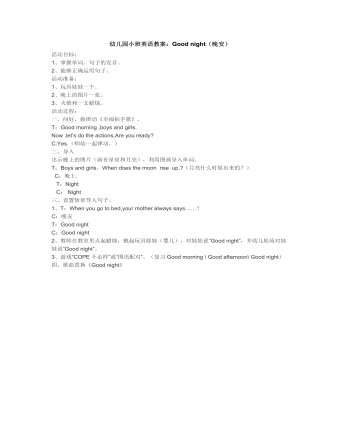
幼儿园小班英语教案:Good night(晚安)
2、能够正确运用句子。 活动准备: 1、玩具娃娃一个。 2、晚上的图片一张。 3、火柴和一支蜡烛。 活动过程: 一、问好,做律动《幸福拍手歌》。 T:Good morning ,boys and girls.Now ,let’s do the actions,Are you ready? C:Yes.(师幼一起律动。) 二、导入 出示晚上的图片(画有星星和月亮),利用图画导入单词。 T:Boys and girls。When does the moon rise up.?(月亮什么时候出来的?) C:晚上. T:Night
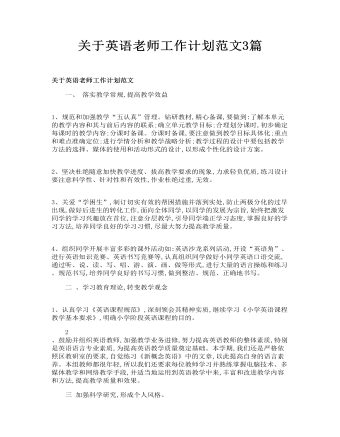
关于英语老师工作计划范文3篇
1、规范和加强教学“五认真”管理。钻研教材,精心备课,要做到:了解本单元的教学内容和其与前后内容的联系;确立单元教学目标;合理划分课时,初步确定每课时的教学内容;分课时备课。分课时备课,要注意做到教学目标具体化;重点和难点准确定位;进行学情分析和教学战略分析;教学过程的设计中要包括教学方法的选择、媒体的使用和活动形式的设计,以形成个性化的设计方案。??2、坚决杜绝随意加快教学进度、拔高教学要求的现象,力求轻负优质,练习设计要注意科学性、针对性和有效性,作业杜绝过重,无效。
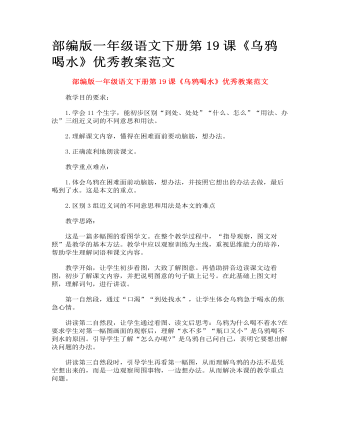
部编版一年级语文下册第19课《乌鸦喝水》优秀教案范文
教学思路: 这是一篇多幅图的看图学文。在整个教学过程中,“指导观察,图文对照”是教学的基本方法。教学中应以观察训练为主线,重视思维能力的培养,帮助学生理解词语和课文内容。 教学开始,让学生初步看图,大致了解图意。再借助拼音边读课文边看图,初步了解课文内容,并把说明图意的句子做上记号。在此基础上图文对照,理解词句,进行讲读。 第一自然段,通过“口渴”“到处找水”,让学生体会乌鸦急于喝水的焦急心情。 讲读第二自然段,让学生通过看图、读文后思考:乌鸦为什么喝不着水?在要求学生对第一幅图画面的观察后,理解“水不多”“瓶口又小”是乌鸦喝不到水的原因。引导学生了解“怎么办呢?”是乌鸦自己问自己,表明它要想出解决问题的办法。 讲读第三自然段时,引导学生再看第一幅图,从而理解乌鸦的办法不是凭空想出来的,而是一边观察周围事物,一边想办法。从而解决本课的教学重点问题。
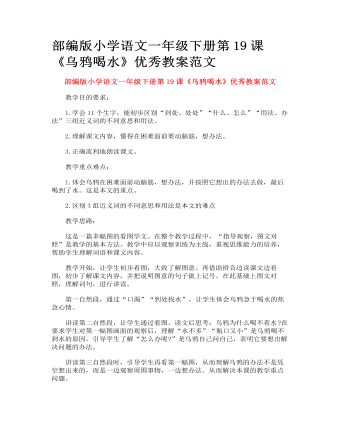
部编版小学语文一年级下册第19课《乌鸦喝水》优秀教案范文
教学思路: 这是一篇多幅图的看图学文。在整个教学过程中,“指导观察,图文对照”是教学的基本方法。教学中应以观察训练为主线,重视思维能力的培养,帮助学生理解词语和课文内容。 教学开始,让学生初步看图,大致了解图意。再借助拼音边读课文边看图,初步了解课文内容,并把说明图意的句子做上记号。在此基础上图文对照,理解词句,进行讲读。 第一自然段,通过“口渴”“到处找水”,让学生体会乌鸦急于喝水的焦急心情。 讲读第二自然段,让学生通过看图、读文后思考:乌鸦为什么喝不着水?在要求学生对第一幅图画面的观察后,理解“水不多”“瓶口又小”是乌鸦喝不到水的原因。引导学生了解“怎么办呢?”是乌鸦自己问自己,表明它要想出解决问题的办法。 讲读第三自然段时,引导学生再看第一幅图,从而理解乌鸦的办法不是凭空想出来的,而是一边观察周围事物,一边想办法。从而解决本课的教学重点问题。
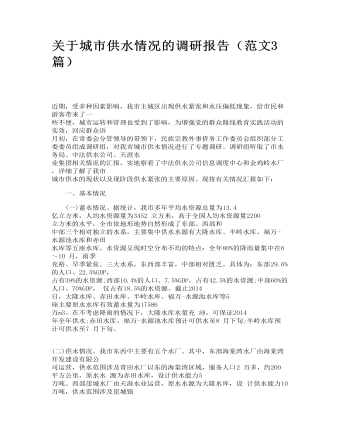
关于城市供水情况的调研报告(范文3篇)
(一)蓄水情况。据统计,我市多年平均水资源总量为13.4 亿立方米,人均水资源量为3452 立方米,高于全国人均水资源量2200 立方米的水平,全市依地形地势自然形成了东部、西部和 中部三个相对独立的水系,主要集中供水水源有大隆水库、半岭水库、福万-水源池水库和赤田 水库等五座水库。水资源呈现时空分布不均的特点:全年80%的降雨量集中在6~10 月,雨季 充裕、旱季紧张。三大水系,东西部丰富,中部相对匮乏。具体为:东部29.6%的人口、22.5%GDP, 占有39%的水资源;西部10.4%的人口、7.5%GDP,占有42.5%的水资源;中部60%的人口、70%GDP, 仅占有18.5%的水资源。截止2014 日,大隆水库、赤田水库、半岭水库、福万-水源池水库等5 座主要原水水库有效蓄水量为17586 万m3。在不考虑降雨的情况下,大隆水库水量充 沛,可保证2014 年全年供水;赤田水库、福万-水源池水库预计可供水至8月下旬;半岭水库预 计可供水至7 月下旬。
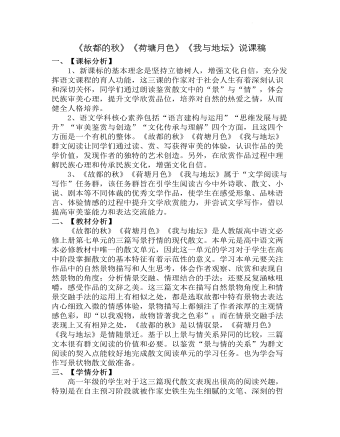
《故都的秋》《荷塘月色》《我与地坛》群文阅读说课稿 2022-2023学年统编版高中语文必修上册
(2) 中国文人的悲秋情结。3.《荷塘月色》中,作者为什么要离开家来到荷塘散步?4. 思考:作者的心里为何“颇不宁静?”(教师补充:写作背景)5. 出门散步后,作者的心情发生变化了吗? 有怎样的变化?6.思考讨论:为什么作者说“我”与“地坛”间有着宿命般的缘分,二者有何相似之处?(阅读1-5段)7.思考:作者从他同病相怜的“朋友“身上理解了怎样的”意图“?三、课堂总结李白说:“天地者,万物之逆旅也。”人生,如同一场旅行,在人生的旅途中,时而高山,时而峡谷,时而坦途,时而歧路。我们或放歌,或悲哭,然而,大自然始终以其不变的姿势深情地看着我们,而我们,也应该学会在与自然的深情对望中,找到生命的契合。正如敬亭山之于李白,故都的秋之于郁达夫,荷塘月色之于朱自清,地坛之于史铁生,他们从中或得到心灵的慰藉、精神的寄托,或得到生存的智慧与勇气,最终完成精神的超脱。
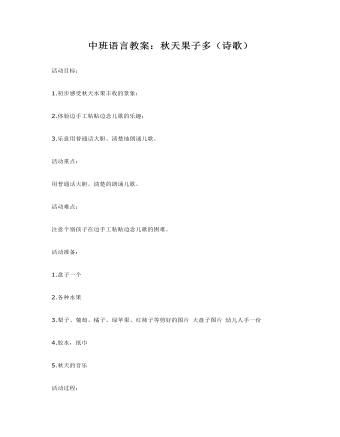
中班语言教案:秋天果子多(诗歌)
2.体验边手工粘贴边念儿歌的乐趣;3.乐意用普通话大胆、清楚地朗诵儿歌。活动重点:用普通话大胆、清楚的朗诵儿歌。活动难点:注意个别孩子在边手工粘贴边念儿歌的困难。活动准备:1.盘子一个2.各种水果
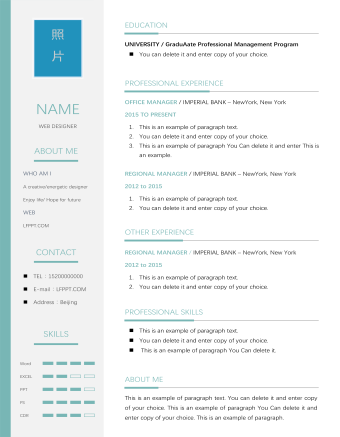
英伦商务应届生英文简历
OFFICEMANAGER / IMPERIAL BANK – NewYork, New York 2015 TOPRESENT1. This is anexample of paragraph text. 2. You candelete it and enter copy of your choice. 3. This is anexample of paragraph You Can delete it and enter This is an example.REGIONALMANAGER / IMPERIAL BANK – NewYork, New York 2012 to20151. This is anexample of paragraph text. 2. You candelete it and enter copy of your choice.
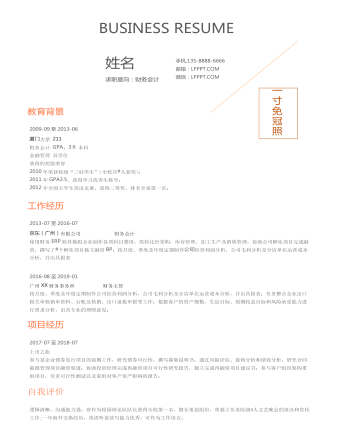
无边框风格中英文简历两套
京东(广州)有限公司 财务会计使用财务ERP软件模拟企业制作各项科目费用,原料比价采购,库存管理,加工生产及销售管理,协助公司孵化项目完成融资,撰写了#个孵化项目独立融资BP;按月度、季度及年度定期制作公司经营利润分析,公司毛利分析及分店单位运营成本分析,并出具报表Jingdong(Guangzhou) Co., Ltd. Financial AccountingUsing financial ERPsoftware to simulate the company's production of various subject costs, rawmaterial price procurement, inventory management, processing production andsales management, assist the company's incubation project to completefinancing, wrote #incubation project independent financing BP; monthly,quarterly and annual production Analysis of the company's operating profit,analysis of the company's gross profit and analysis of the operating costs ofthe branch, and issue a report
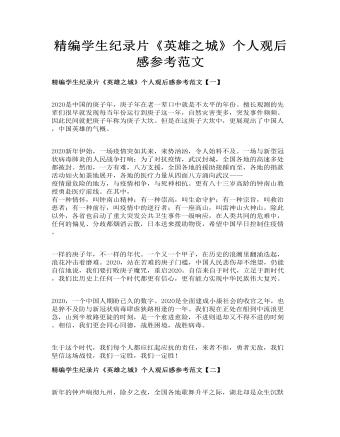
精编学生纪录片《英雄之城》个人观后感参考范文
一样的庚子年,不一样的年代。一个又一个甲子,在历史的浪潮里翻涌迭起,浪花冲击着磨难。2020,站在苦难的庚子门槛,中国人民悲伤却不绝望,仍能自信地说,我们要打败庚子魔咒,重启2020。自信来自于时代,立足于新时代,我们比历史上任何一个时代都更有信心,更有能力实现中华民族伟大复兴。 2020,一个中国人期盼已久的数字。2020是全面建成小康社会的收官之年,也是猝不及防与新冠状病毒肆虐狭路相逢的一年。我们现在正处在船到中流浪更急,山到半坡路更陡的时刻,是一个愈进愈险,不进则退却又不得不进的时刻。相信,我们更会同心同德,战胜困境,战胜病毒。 生于这个时代,我们每个人都应扛起应抗的责任,来者不拒,勇者无敌,我们坚信这场战役,我们一定胜,我们一定胜!
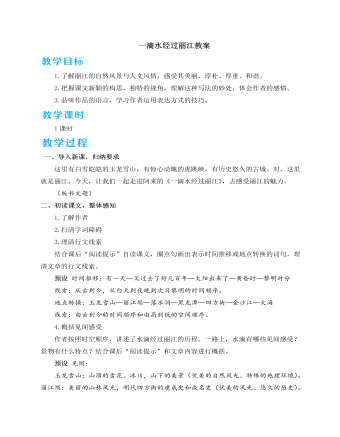
人教部编版语文八年级下册《一滴水经过丽江》教案
【设计意图】从诗意的语言入手,引导学生关注句式节奏、抒情性、叙事性、哲理性,品析语言,从而加深对文本的理解,体会作者对丽江的热爱、赞美之情,体会作者在景物描写中隐含的思想。五、总结存储1.教师总结作者虚构一个旅游者兼讲述者——“一滴水”,用它形成时空线索,串联起丽江的自然风光、历史文化、民俗风情,并着力表现景物背后的丽江的人文精神,来抒发作者对丽江古城与自然美妙融合的赞美之情,对丽江的醇美、和谐、沉静的赞美之情,对传统与现代文明和谐交融的赞美之情,对自然万物的热爱和生命平等的意识。诗意的语言中,有强烈的抒情,有厚重的历史感,有深邃的哲思。这“一滴水”折射出的,是阿来的思想、灵魂。2.布置作业(1)模仿本文的写法,写一篇不少于600字的随笔,选择一个恰当的视角,跨越时空,全面多角度展现家乡的自然风光、历史文化、风土人情。(2)课外阅读阿来的《大地的阶梯》,体会融景物、历史、感悟、思考于一体的游记风格。
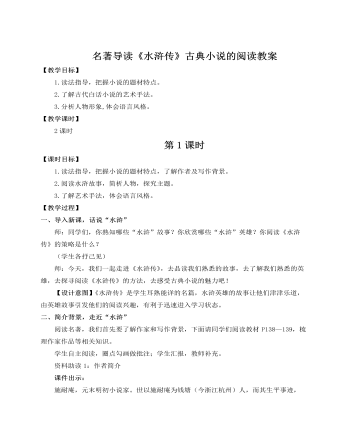
人教部编版语文九年级上册名著导读 《水浒传》 古典小说的阅读教案
《智取生辰纲》的核心人物是吴用和杨志,他们的对决实在精彩。杨志为了保住生辰纲可谓智计百出:他为了掩人耳目,故意不多带兵,“智藏行踪”;离京五七日后杨志对时间调整,由五更起日中歇,变为辰牌起申时歇,这说明他小心谨慎,“智变行辰”;放着宽平的官道不走,净找些偏僻崎岖的小径自讨苦吃,这样难走的路径,恐怕连歹人也不愿走,“智选路径”。这些行为可见杨志精明多智。可是吴用竟然道高一尺,制订软取计划,充分考虑时、地、人三个因素:天气炎热,押运者必有懈怠之处,利用天时,以药酒作为武器;黄泥冈为必经之途,人烟稀少,易于动作,于此设伏,占有地利;杨志为人精细,武艺高强,如果硬取一时未必得手,即使得手也未必能顺利脱身。所以吴用完全围绕杨志实施软取计划。①乔装歇凉黄泥冈贩枣客,麻痹杨志一行。②白胜挑酒故意不卖,贩枣人买下一桶,当面吃尽,显示酒中无药,迷惑杨志一行。③在另一桶舀酒,一人抢吃一瓢,一人再来桶里舀酒,巧下药,蒙骗杨志一行。④白胜赌气不卖,贩枣人好心调解,引诱杨志一行。以上计划,皆是吴用精心设计。精明如杨志,亦不能不中其计。实在精彩啊!

新人教版高中英语必修1Unit 1 Teenage Life-Listening and Speaking & Listening and Talking教案
Step 2 Listening and Talking1. The teacher is advised to talk with their new students about the related topic: Boys and girls, do you know some structures to talk about future activities? Talking about future activitiesWe’ll …I plan to …There’ll be …I hope to …We’re going to …2. After their small talk, the teacher can move on by playing the listening and solve the following task.Underline the expressions in the sentences below Cao Jing and Max use to talk about the future.We’ll learn useful skills.I plan to improve my spoken English.There’ll be students from different schools.I hope to make new friends.We’ll talk about teenage life.I’ll learn to make a fire.There’ll be students from different countries at the camp.There’ll be some experts there to show us how to live in the wild.We’re going to learn about wildlife.I’m going to give a speech.I think I’m going to enjoy the activities.I think we’ll have a lot of fun.3. Work in groups. Plan a youth camp.Teacher make the Ss think of ideas for the camp. And they can use the questions below to get started. And have the Ss present their ideas for a youth camp to the class.●What kind of camp is it?●Who will be there?●What will they do?●What will they learn?

新人教版高中英语必修1Unit 2 Travelling Around-Listening and Speaking & Listening and Talking教案
【教学目标与核心素养】1. Instruct students to get main facts by listening and motivate them to talk about the topics about how to prepare for the trip and make reservations by listening and ultimately can make travel arrangements and reservations. 2. Develop students’ sense of cooperative learning and individual thinking capability. 3. Develop students’ different listening skills to solve different listening comprehensive problems.4. Help students to understand how to use the structures “the present continuous tense (be doing) is used to express future plans.【教学重难点】1. Teach students how to focus on key words, not on single words or grammar.2. Prompt Ss to talk about the related topics, such as how to prepare for the trip and make a travel plan.【教学过程】Step 1: Listening and SpeakingLead inThe teacher is advised to talk with their students about the places that they want to travel most both at home and abroad: boys and girls, if you have a chance to travel around the world, where will you go? After their small talk, the teacher can move on by finishing the following listening task:Before travelling, what do we need to prepare for the trip?

新人教版高中英语必修1Unit 3 Sports and Fitness-Listening and Speaking & Listening and Talking教案
Finally, after finishing the task above, the teacher is expected to instruct students to work in groups to finish the following project:Speaking ProjectWhat event or activity would you like to invite your friend to? Make a conversation with a partner.Ski Race: Zhangjiakou, a beautiful city in northern China, will host the Youth Ski Race in December.Track Meet: a great event for track –and –field lovers on 26 October.Gym Class: come and work out at a gym! You can make it.Part 2: Listening and Talking:The teacher is advised to talk with their new students about the related topic: Boys and girls , what do you think of sportsmanship? Let’s listen and find out:Play the listening and match each opinion with the right speaker. Who do you agree with? Why?Cao Jing _____________ Lily _____________ Max _____________A. An athlete should do his/her best to win.B. The girl should stop and help the other girl. Good sportsmanship is more important than wining!C. An athlete should think about honor and his/her fans if he/she is competing for his/her country.Listen again and circle the expressions that you hear in the conversation.

新人教版高中英语必修1Unit 3 Sports and Fitness- Discovering Useful Structures—tag questions教案
【教材分析】This teaching period mainly deals with the grammar: tag questions.This period carries a considerable significance to the cultivation of students’ spoken English. The teacher is expected to enable students to master this period thoroughly and consolidate the knowledge by doing some exercise of good quality.【教学目标与核心素养】1. Get students to have a good understanding of the basic usages of tag questions.2. Enable students to use the basic phrases structures flexibly.3. Develop students’ speaking and cooperating abilities.4. Strengthen students’ great interest in grammar learning.【教学重难点】1. How to enable students to have a good understanding of the basic usages of tag questions.2. How to enable students to use the basic usages of tag questions flexibly.【教学过程】Step1: 语法自主探究一、基本组成方法1.肯定式陈述部分+否定附加疑问部分(前肯后否) You often play badminton, don’t you? 你经常打羽毛球,是吗?You are going to the gym with me, aren’t you?你要和我一起去健身房,是吗?She’s been to shanghai before, hasn’t she? 她以前去过上海,是吗?2.否定式陈述部分+肯定附加疑问部分(前否后肯) It isn't a beautiful flower, is it? 那不是美丽的花,是吗?You didn't go skating yesterday, did you? 你昨天没去滑冰,是吗?They can’t finish it by Friday, can they?他们不能在星期五之前完成,是吗?

新人教版高中英语必修3Unit 1 Festivals and celebrations-Discovering Useful Structure教学设计
4.That was an experience that frightened everyone. →That was _____________________. 答案:1. taking 2. being discussed 3. in the reading room 4. a frightening experienceStep 6 The meaning and function of V-ing as the predicative动词-ing形式作表语,它通常位于系动词后面,用以说明主语“是什么”或“怎么样”一种表示主语的特质、特征和状态, 其作用相当于形容词; 另一种具体说明主语的内容, 即主语等同于表语, 两者可互换。The music they are playing sounds so exciting. 他们演奏的音乐听起来令人激动。The result is disappointing. 结果令人失望。Our job is playing all kinds of music. 我们的工作就是演奏各种音乐。Seeing is believing. 眼见为实。Step 7 Practice1. It is ________(amaze) that the boy is able to solve the problem so quickly.2. Buying a car is simply _______(waste) money. 3. Please stop making the noise—it’s getting ________(annoy). 4. complete the passage with the appropriate -ing form.La Tomatina is a festival that takes place in the Spanish town Bunol every August. I think many food festivals are __________ because people are just eating. however, this festival is _________ because people don't actually eat the tomatoes. Instead, they throw them at each other! the number of people ________ part in this tomato fight, can reach up to 20,000, and it is a very __________ fight that lasts for a whole hour. The _______ thing is how clean Bunol is after the tomatoes are washed away after the fight. this is because the juice form tomatoes is really good for making surfaces clean!答案:1. amazing 2. wasting 3. annoying4. boring interesting taking exciting amazing

新人教版高中英语必修3Unit 1 Festivals and Celebrations-Reading and Thinking教学设计
The topic of this part is “Discover the reasons for festivals and celebrations.The Listening & Speaking & Talking part aims at talking about the experiences and feelings or emotions about the festivals and celebrations. This section aims at detecting the reason why the people celebrate the festivals, the time, the places, the types and the way of celebrations. It also explains why some traditions in the old celebrations are disappearing, like the firecrackers in the big cities and some new things are appearing like the prosperity of business or commerce. 1. Students can talk about what festivals they know and the reasons and the way of celebrating them.2. Students should learn the reading skills such as the headline and get the topic sentences, the structures of articles.3. Students can understand the past, the present situation of some festival around the world and why there are some changes about them. 4. Students can have the international awareness about the festivals.1. Students should learn the reading skills such as the headline and get the topic sentences, the structures of articles.2. Students can understand the past, the present situation of some festival around the world and why there are some changes about them.Step 1 Lead in---Small talkWhat festival do you like best ? Why ?I like the Spring Festivals because I can set off the fireworks, receive the lucky money and enjoy the Gala with my families.Step 2 Before reading---Pair workWhy do people celebrate different festivals ?The Spring Festivals is to celebrate the end of winter and the coming of spring and new life.The Mid-autumn Day is to celebrate the harvest and admire the moon.

新人教版高中英语必修3Unit 1 Festivals and Celebrations-Listening &Speaking&Talking教学设计
The theme of this section is “Talk about festival activities and festival experiences”.Festival and holiday is a relaxing and interesting topic for students. This part talks about the topic from the daily life of students’. In the part A ---Listening and Speaking, there are three conversations among different speakers from three countries(Japan, Rio and China), where the speakers are participating in or going to participate in the festivals and celebrations. So listening for the relationship among them is a fundamental task. Actually, with the globalization and more international communication, it is normal for Chinese or foreigners to witness different festivals and celebrations in or out of China. In the Conversation 1, a foreign reporter is interviewing a Japanese young girl who just had participated in the ceremony of the Coming-of-Age Day on the street and asking her feeling about the ceremony and the afterwards activities. Conversation 2, Chinese girl Li Mei is witnessing the Rio Carnival for the first time, and her friend Carla gives her some advice on the costumes which enables her to match with the carnival to have a good time. Conversation 3, a Chinese guide is showing a group of foreign visitors around the Lantern Festival and introducing the customs of the festival to them. The three conversations have a strong vitality and insert the festival and cultural elements from different countries. So perceiving the festivals and cultures from different countries is the second task. At the same time, the scripts also insert the targeted grammar --- v-ing as attributive and predicative, which students can perceive and experience in a real context and make a road for the further study. That is the third task. In the Part B--- Listening and Talking, the theme is “Talk about festival experience”, which is the common topic in our daily conversations. During the conversation, Song Lin, a Chinese student, asked Canadian friend Max about how to spend Christmas. In the conversation, Song Lin talked about experience and the feelings during the Chinese Spring Festival, during which there are not only some enjoyable things but some unpleasant things. After the listening, perhaps students find there are some similarities between Christmas and the Chinese Spring Festival as there are some differences in the origins and celebrations. For example, people always visit friends and relatives, decorate their houses, have a big dinner together, chat and give presents to each other.

新人教版高中英语必修3Unit 1 Festivals and Celebrations-Reading for writing教学设计二
Step 3 Analyzing article structureActivity 31. Teachers raise questions to guide students to analyze the chapter structure of this diary and think about how to describe the festival experience. (1)What should be included in the opening/body/closing paragraph(s)?(2)How did the writer arrange his/her ideas?(3)What kind of interesting details did the writer describe?(4)How did the writer describe his/her feelings/emotions during the event?2. Students read and compare the three sentence patterns in activity 2. Try to rewrite the first paragraph of the diary with these three sentence patterns. After that, students exchange corrections with their partners. Such as:●This was my first time spending three days experiencing the Naadam Festival in China’s Inner Mongolia Autonomous Region and it was an enjoyable and exciting experience. ●I'll never forget my experience at the Naadam Festival because it was my first time to watch the exciting Mongolian games of horse racing, wrestling, and archery so closely. ●I'll always remember my first experience at the Naadam Festival in China’s Inner Mongolia Autonomous Region because it was so amazing to spend three days witnessing a grand Mongolian ceremony. Step 4 Accumulation of statementsActivity 41. Ask the students to read the diary again. Look for sentences that express feelings and emotions, especially those with the -ing form and the past participle. Such as:● …horse racing, wrestling, and archery, which are all so exciting to watch. ● some amazing performances● I was surprised to see…● I was a little worried about. . . ● feeling really tiredOther emotional statements:●I absolutely enjoyed the archery, too, but the horse races were my favourite part. ●I'm finally back home now, feeling really tired, but celebrating Naadam with my friend was totally worth it. ●He invited me back for the winter to stay in a traditional Mongolian tent and cat hot pot. I can’t wait!2. In addition to the use of the -ing form and the past participle, the teacher should guide the students in the appreciation of these statements, ask them to memorize them, and encourage them to use them reasonably in writing practice.

